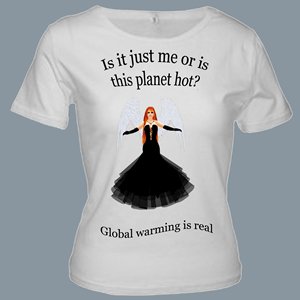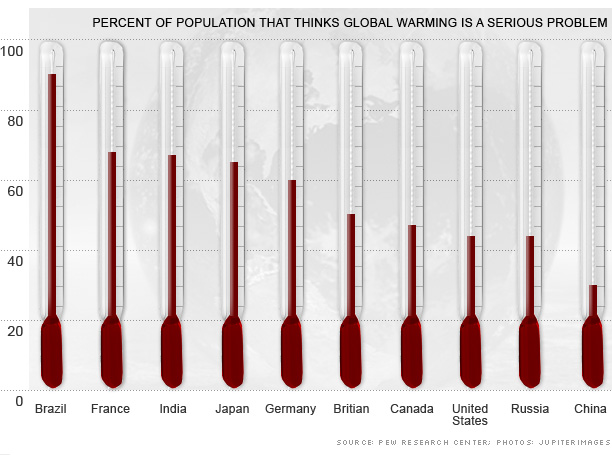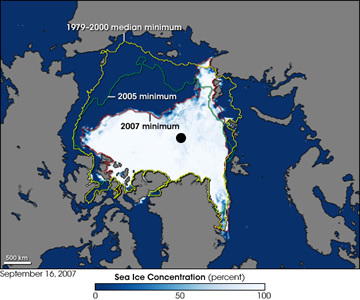Global Warming Is Real!

A terrifying report from the New York Times of May 24, 2010
A Survey in February by the BBC found that only 26 percent of Britons believed that “climate change is happening and is now established as largely manmade,” down from 41 percent in November 2009. A poll conducted for the German magazine Der Spiegel found that 42 percent of Germans feared global warming, down from 62 percent four years earlier.
The lack of fervor about climate change is also true of the United States, where action on climate and emissions reduction is still very much a work in progress, and concern about global warming was never as strong as in Europe. A March Gallup poll found that 48 percent of Americans believed that the seriousness of global warming was “generally exaggerated,” up from 41 percent a year ago.
A good source for a balanced overview of global warming science. New York Times Archive
How To Prove Global Warming Is Real. At Home In Your Pajamas.
For those still crazy enough to need it proven.
1. Roll up sleeves and sit at computer. Make pajamas comfortable. Pour drink to prepare for shock.
2. Go to web site known to all as Google.
3. Find answers to following questions:
A. Was New Orleans destroyed by a 100 year storm?
B. Did Europe suffer a 100 year heat wave in 2003 which caused 27-46,000 deaths?
C. Did Russia in 2010 have its warmest summer since climate records began?
D. Was the 2008 Atlantic hurricane season unprecedented in the number of named hurricanes? Were the 2004, 2005, and 2008 hurricane seasons the three most destructive on record?
E. Is Arctic and Antarctic sea ice melting at unprecedented rates, releasing enormous icebergs up to 100 miles long and threatening to permanently open up the Northwest sea passage for the first time in seafaring history?
F. Add your own abnormal local climate event here. My city set an all time temperature high.
G. Has the Indian continental monsoon been geographically displaced?
H. Are coral reefs around the world dying? Especially in the Great Barrier Reef?
I. Are certain birds and other animals no longer migrating seasonally?
J. Are birds moving farther north to remain in the same climactic habitat?
K. Are monsoon rains causing unprecedented flooding in China?
L. Are the glaciers melting all over the world?
M. Is there an unprecedented drought in the Amazon Basin, rendering the Amazon River at a record low?
N. Are there record forest fires in Australia?
O. Are there still many many abnormal climatic events which are not on this brief list?
Answers:
A - O. Yes. Omg! Yes. Help!
The number of unusual climate events has risen everywhere in the world simultaneously.
Now ask yourself this question:
If the climate is not changing then how can there be so many 100 year climate events taking place within a period of 10 years?
They're only supposed to happen roughly once every 100 years!
Many lobbyist groups will answer this question by saying 'I don't know, but there's no evidence for global warming.'
What they are actually saying is this: 'I am so completely ignorant of science that I don't even realize that these statistics are proof of global warming.'
What they are also not saying is that they are making money by lying to the public.
And that they are unfit to govern in the public interest.
The real answer to the question of how there can be so many 100 year events taking place in a 10 year period if the climate is not changing, is that there effectively cannot.
Something unprecedented is happening to the climate.
So What Is It That Is Happening To Our Climate?
Unless we have 2 contenders for the cause of so many unprecedented global climate effects happening simultaneously, I think we can safely conclude that global warming is real.
And there are simply no other reasonable scientific contenders for the cause of it all.
Now swallow that drink to recover from the shock.
And start talking about it to everyone you meet. Because their ignorance is going to get us all killed.
You can use my name in the conversation.


An Interesting Survey Graphic On Global Warming Denial

A Map of Arctic Ice Shrinkage 1979- 2007: Yikes!

This map was made in 2007. It's even worse now.

A Terrifying Look At Recorded Climate Statistics For 2010.
2010 will almost certainly be one of the three warmest years since 1850, according to the World Meteorological Organisation
by John Vidal,
The Guardian, UK, December 2010
2010 will almost certainly rank as one of the three warmest years since temperature records began in 1850, according to the World Meteorological Organisation (WMO).
The final ranking for 2010 will not become clear until November and December data are available in early 2011, but November global temperatures are similar to those observed in November 2005, suggesting that despite the freezing weather across the UK, 2010 is on track for near record levels.
The past 10 years have also been the hottest decade on record, with temperatures for January to October averaging 0.46C above the 1961-90 average, 0.03C above the 2000-09 mean and the highest value yet recorded for a 10-year period. The data were released at the UN climate talks in Cancún.
2010 saw heat records tumble in 17 countries and an unprecedented month-long heatwave in Russia. It will be followed by cooler global temperatures in 2011 according to climate scientists from the UK government Met Office and the University of East Anglia.
Michel Jarraud, director general of the WMO, said the global warming trend was now indisputable. When asked whether the findings were indicative of warming caused by human activities he said, "The short answer is yes. There is statistically significant warming above the normal variability."
"These are the facts. If nothing is done the [warming] curve will go up and up and up. If we continue this trend the heatwave in Europe in 2003 will not be exceptional. It will be on the cool side. This is what will happen."
The analysis follows temperature data released by Nasa and Noaa in the US, which also suggest that 2010 is on course to be the hottest year on record.
Dr Adam Scaife, head of long range forecasting at the UK Met Office, said: "The three leading global temperature datasets show that, so far, 2010 is clearly warmer than 2009 despite El Niño declining and being replaced by a very strong La Niña, which has a cooling effect."
The most extreme temperature anomalies occurred across most of Canada and Greenland, where annual temperatures were 3C or more above normal and across much of Africa and south Asia where annual temperatures were 1-3C above normal.
Heat records were broken in 17 countries including Belarus, Ukraine, Finland, Russia, Sudan, Niger and Saudi Arabia. Pakistan had Asia's hottest ever recorded day when the temperature in the abandoned city of Mohenjo-daro reached 53.7C (129F).
Guinea, in west Africa, was the only country in the world to have recorded a record low temperature in 2010, but said the WMO, below-normal temperatures were recorded in Siberia, parts of South America, interior Australia and the southeast United States
Britain, Germany, France and Norway all had their coolest years since 1996 due mainly to below-normal temperatures during the winter.
The Met office, which correctly predicted last year that 2010 would be one of the warmest on record, said next year would not be a record year but could still be in the top 10. The 10 warmest years on record have all occurred since 1996.
Temperatures in 2009-10 have been affected by the phenomenon known as El Niño which follows the warming of the Pacific ocean near the equator. It is followed by a cooling period, known as La Niña.
"Although La Niña has now stabilised, it is still expected to affect global temperature through the coming year," said the Met office study.
Hot and cold in 2010
• Pakistan experienced the worst flooding in its history as a result of exceptionally heavy monsoon rains.
• The northern hemisphere summer saw exceptional heatwaves in several parts of Eurasia. In Moscow, July mean temperatures were 7.6C above normal, making it the city's hottest month on record by more than 2C.
• Ireland and Scotland both experienced their coldest winter since 1962-63. Many other parts of northern and central Europe had their coldest winter since 1978-79.
• Canada had its warmest winter on record, with national temperatures 4C above the long-term average; winter temperatures were 6C or more above normal in parts of the country's north.
• Most of the continental United States was colder than normal. For the US as a whole it was the coldest winter since 1984-85, and most southern areas from Texas eastwards had one of their 10 coldest winters on record.
• Parts of the Amazon basin were badly affected by drought with the Rio Negro, a major Amazon tributary, falling to its lowest level on record. Earlier in the year, Guyana and the eastern Caribbean islands were badly affected by drought.
• In Asia, parts of southwestern China experienced severe drought through late 2009 and early 2010. Yunnan and Guizhou provinces both had their lowest rainfalls on record.

The Psychology of Climate Change Denial
Wired Magazine, Science News, December, 2009
by Brandon Keim
Even as the science of global warming gets stronger, fewer Americans believe it’s real. In some ways, it’s nearly as jarring a disconnect as enduring disbelief in evolution or carbon dating. And according to Kari Marie Norgaard, a Whitman University sociologist who’s studied public attitudes towards climate science, we’re in denial.
“Our response to disturbing information is very complex. We negotiate it. We don’t just take it in and respond in a rational way,” said Norgaard.
The Intergovernmental Panel on Climate Change declared in 2007 that greenhouse gases had reached levels not seen in 650,000 years, and were rising rapidly as a result of people burning fossil fuel. Because these gases trap the sun’s heat, they would — depending on human energy habits — heat Earth by an average of between 1.5 and 7.2 degrees Fahrenheit by century’s end. Even a midrange rise would likely disrupt the planet’s climate, producing droughts and floods, acidified oceans, altered ecosystems and coastal cities drowned by rising seas.
“If there’s no action before 2012, that’s too late. What we do in the next two to three years will determine our future,” said Rajendra Pachauri, the IPCC chairman, when the report was released. “This is the defining moment.”
Studies published since then have only strengthened the IPCC’s predictions, or suggested they underestimate future warming. But as world leaders gather in Copenhagen to discuss how to avoid catastrophic climate change, barely half the U.S. public thinks carbon pollution could warm Earth. That’s 20 percent less than in 2007, and lower than at any point in the last 12 years. In a Pew Research Center poll, Americans ranked climate dead last out of 20 top issues, behind immigration and trade policy.
Wired.com talked to Norgaard about the divide between science and public opinion.
Wired.com: Why don’t people seem to care?
Kari Norgaard: On the one hand, there have been extremely well-organized, well-funded climate-skeptic campaigns. Those are backed by Exxon Mobil in particular, and the same PR firms who helped the tobacco industry deny the link between cancer and smoking are involved with magnifying doubt around climate change.
That’s extremely important, but my work has been in a different area. It’s been about people who believe in science, who aren’t out to question whether science has a place in society.
Wired.com: People who are coming at the issue in good faith, you mean. What’s their response?
Norgaard: Climate change is disturbing. It’s something we don’t want to think about. So what we do in our everyday lives is create a world where it’s not there, and keep it distant.
For relatively privileged people like myself, we don’t have to see the impact in everyday life. I can read about different flood regimes in Bangladesh, or people in the Maldives losing their islands to sea level rise, or highways in Alaska that are altered as permafrost changes. But that’s not my life. We have a vast capacity for this.
Wired.com: How is this bubble maintained?
Norgaard: In order to have a positive sense of self-identity and get through the day, we’re constantly being selective of what we think about and pay attention to. To create a sense of a good, safe world for ourselves, we screen out all kinds of information, from where food comes from to how our clothes our made. When we talk with our friends, we talk about something pleasant.
Wired.com: How does this translate into skepticism about climate change?
Norgaard: It’s a paradox. Awareness has increased. There’s been a lot more information available. This is much more in our face. And this is where the psychological defense mechanisms are relevant, especially when coupled with the fact that other people, as we’ve lately seen with the e-mail attacks, are systematically trying to create the sense that there’s doubt.
If I don’t want to believe that climate change is true, that my lifestyle and high carbon emissions are causing devastation, then it’s convenient to say that it doesn’t.
Wired.com: Is that what this comes down to — not wanting to confront our own roles?
Norgaard: I think so. And the reason is that we don’t have a clear sense of what we can do. Any community organizer knows that if you want people to respond to something, you need to tell them what to do, and make it seem do-able. Stanford University psychologist Jon Krosnick has studied this, and showed that people stop paying attention to climate change when they realize there’s no easy solution. People judge as serious only those problems for which actions can be taken.
Another factor is that we no longer have a sense of permanence. Another psychologist, Robert Lifton, wrote about what the existence of atomic bombs did to our psyche. There was a sense that the world could end at any moment.
Global warming is the same in that it threatens the survival of our species. Psychologists tell us that it’s very important to have a sense of the continuity of life. That’s why we invest in big monuments and want our work to stand after we die and have our family name go on.
That sense of continuity is being ruptured. But climate change has an added aspect that is very important. The scientists who built nuclear bombs felt guilt about what they did. Now the guilt is real for the broader public.
Wired.com: So we don’t want to believe climate change is happening, feel guilty that it is, and don’t know what to do about it? So we pretend it’s not a problem?
Norgaard: Yes, but I don’t want to make it seem crass. Sometimes people who are very empathetic are less likely to help in certain situations, because they’re so disturbed by it. The human capacity of empathy is really profound, and that’s part of our weakness. If we were more callous, then we’d approach it in a more straightforward way. It may be a weakness of our capacity as sentient beings to cope with this problem.
“Cognitive and Behavioral Challenges in Responding to Climate Change,” Norgaard’s World Bank white paper.


